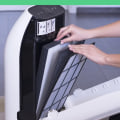Air purifiers are devices that combine a fan and an internal filter to eliminate unwanted particles from the air in a particular room. The purified air is then re-circulated, constantly improving indoor air quality. Ozone-emitting air purifiers usually have it indicated on the packaging or in the commercial descriptions. No special installation is necessary for flat filters, but it is essential to make sure you are using the right size for the compartment. If you are interested in buying an air filter that uses ionizers, make sure it does not produce dangerous levels of ozone, a gas composed of three oxygen atoms that can irritate the lungs and further aggravate any asthmatic condition.
A recent report from the United States Environmental Protection Agency revealed that indoor air can have up to five times higher levels of contaminants such as mold, pesticides and particulates than outdoor air, making the idea of a device that eliminates these pollutants, as well as allergens such as dust, pet dander and pollen, a healthy option. This step is not something your air conditioning system does on its own, but without a clean air filter, you won't be able to filter unwanted particles from the air. You can also simply turn on the heating, ventilation and air conditioning fan to circulate air throughout the house without “conditioning” it. You can even incorporate additional filters, such as an electrostatic precipitator, to increase purification. The air purifier takes time to capture these particles, and by the time the air enters the purifier, it may have already arrived through the nose. But what if you can't get an air purifier? Could you make your own? Actually, yes; all you need is a box fan and a HEPA or high-quality filter.
All models included in the Good Housekeeping Institute's rigorously tested guide to the best air purifiers you can buy have a true HEPA filter. Air purifiers can improve the environment when placed next to a sick patient, but they don't protect against COVID. In terms of improving air quality, a high-quality whole-home air filter is best, as it treats all the air in circulation. If the filter does not fit snugly into the compartment, there will be air spaces that will allow dirt to pass through. However, researchers didn't take into account factors such as open windows, room size, and airflow, all of which will affect how an air purifier works under real conditions.



